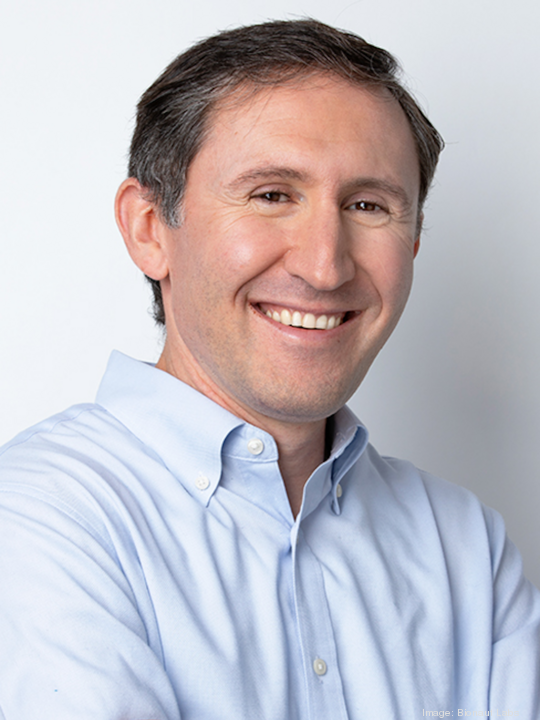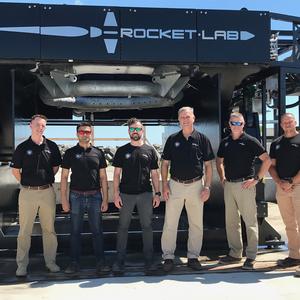
Fresh off a financing round of more than $43 million, an L.A. startup is preparing to bring its first two therapies to Phase 1 clinical trials.
Bionaut Labs develops precision micro-robotic technology to deliver therapies to the center of the brain, powered by magnetic propulsion.
This can be challenging, especially in terms of treating neurodegeneration and brain cancers, CEO Michael Shpigelmacher told L.A. Inno. He said Bionaut’s delivery system can prevent some side effects and toxicity from drugs that affect the entire body.
The neurodegenerative disease market is expected to reach $53 billion by 2030. It’s estimated that neurodegenerative diseases cost $655 billion a year in medical expenses and economic loss worldwide.
Funding will fuel clinical trials
The recent funding will support what's known as "good laboratory practices" and clinical trials for two endeavors.
First, Bionaut will focus on a microsurgical device for the treatment of Dandy Walker Syndrome, a congenital disorder where most patients develop an obstruction in the back of the brain that prevents the normal flow of cerebral spinal fluid.
Shpigelmacher said that currently these cysts cannot be reached by surgeons, due to their position in the brain.
"However, a millimeter sized Bionaut can reach this area at the base of the brain to pierce the cyst...in order to restore normal brain function and development," he told L.A. Inno.
Next, the startup will turn its attention to a drug-delivery system — to deliver chemotherapy to treat a form of pediatric brain cancer known as midline glioma
Shpigelmacher said that as of now, this condition cannot be treated with standard cancer therapies because drugs cannot penetrate through blood vessels to get to the tumor.
Bionaut intends to deliver a drug directly to the tumor.
“Both conditions were chosen to target first based on their high unmet medical need and difficulty for treating disease in the mid- and hind-brain," Shpigelmacher said.
Breaking the pharma paradigm
Bionaut was founded in 2016 by Shpigelmacher and Aviad Maizels, both Israeli robotics entrepreneurs. Shpigelmacher’s work on a reformulation strategy for McKinsey spawned the idea for Bionaut.
Reformulation is a process where a pharma company changes the delivery mechanism of a drug, like turning an oral drug into a transdermal patch.
But for Shpigelmacher, drug reformulation did not go far enough. It "does not solve the root of the drug access problem in modern medicine, namely, flooding the whole body with drugs to treat diseases localized to specific areas in the body," he said.
So he set his sights on disrupting that paradigm and finding a way to get drugs precisely where they need to be.
When he and Maizels first started working on what would become Bionaut, they partnered with an academic team at the Max Planck Institute of Science in Germany, which was working on an early-stage micro-machine technology of its own.
The duo saw the potential of evolving this tech into medical micro-robots, which they dubbed “Bionauts.” Over the next six years, the Bionaut team took the tech from academic proof-of-concept to a full product design.
That design has been shown to be safe in pre-clinical studies, Shpigelmacher said.
Bionaut Labs emerged from stealth in 2021 with $20 million in funding. The two co-founders self-financed the company at the pre-seed stage.
Khosla Ventures led the recent Series B. It also led a $20 million Series A round, which closed in 2021.
Precision delivery
By treating conditions locally, instead of broadly flushing the body with medicine — even the healthy parts — Bionaut is able to treat areas of the body with precision, Shpigelmacher said.
The closest competitors are working on different drug delivery vehicles to target specific cells in the body, or to cross the blood brain barrier, he added.
“(We) can bring drugs of all types, small molecules or biologics, directly to the site of disease where it’s needed, in a minimally-invasive manner,” he told L.A. Inno.
Bionaut intends to license its tech as a delivery platform to biopharma partners.
Prior experience with robotics
Prior to starting Bionaut Labs, Shpigelmacher and Maizels built PrimeSense, a robotics company that enables machines to see the world in 3D. Maizels was president and founder, and Shpigelmacher was an early advisor.
Apple acquired the company in 2013 for around $350 million. Today PrimeSense’s tech is embedded in iPhones, providing the facial recognition capability known as FaceID, Shpigelmacher said.
Benefits of being in L.A.
Bionaut Labs has approximately 40 full-time employees, mainly based in Los Angeles. It also has a research center in Israel and maintains an “active” collaboration with the Max Plank Institute.
Its headquarters is in the Culver City neighborhood of Los Angeles, and is mainly occupied by an R&D team.
"The L.A. ecosystem offers access to top academic institutions and to talent in in biomedical engineering, pharma as well as robotics," Shpigelmacher said. "In addition, our first investors, Upfront Ventures and BOLD Capital Partners, are both based in L.A., and are fully aligned with our vision to build the company in L.A."



